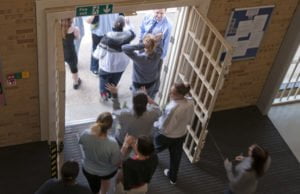Facing challenges and creating hope in a women’s prison
If the recent election campaign and worries about even more funding cuts in the criminal justice system have left you in need of some inspiration, I’ve got just the thing – Clare McGregor’s account of the coaching service she set up and delivers to women prisoners in HMP Styal.
Coaching is normally thought of as a sort of high-powered mentoring service for senior executives and that’s exactly how Clare McGregor did it for years until the recession dried up her criminal justice consultancy and she decided to provide free coaching in Styal. This initiative evolved into a charity called CIAO – Coaching Inside And Out.
The book fulfils a number of purposes.
- In one way, it is a simple account of the process of setting up and delivering the coaching service.
- But it also gives us an insight into the lives and experiences of women in prison.
- The book is engagingly honest about how it felt to be a coach in prison, especially for those coaches who had no previous experience of the criminal justice system.
- Additionally, it functions as a “how-to” manual and seeks to identify critical success factors, how coaching has to adapt to the prison environment and some of the tools and techniques used.
- Finally, it shows the change and hope coaching can bring.
[divider]
The power of coaching
I’m not going to try to summarise Clare McGregor’s profound understanding of coaching and what it can achieve. But I’ve been lucky enough to experience excellent coaching myself and know first-hand how invigorating and inspirational it can be in the most unexpected way. Unexpected because proper, chief executive/leadership coaching is all about empowerment, getting people to realise they can solve their own problems and challenges.
What a perfect model, then, to use to work with some of the most disempowered people you’ll ever meet.
There are some key ingredients to what the project’s evaluators found was a very successful approach. The ones that struck me in particular are:
Treating clients as people, not offenders.
Ms McGregor is clear that CIAO wants to do much more than simply reduce crime. The charity deliberately set a positive goal of helping clients to help themselves to reach their potential. This strengths-based approach proved to be very effective even, or rather particularly, with women with entrenched patterns of depression, self-harm and an almost invisible sense of self-worth.
Clients told project evaluators that they found it very powerful that coaches were interested in them, not what they had done
The importance of choice
CIAO worked hard to ensure that the women in Styal had a real choice about whether they participated in coaching or not. They tried to ensure that being coached wasn’t just something you had to do in order to get home leave or an earlier parole date.
Hope and the prospect of a better future
Many clients in the prison expressed very clearly why they preferred coaching to many of the other supportive interventions that they had been offered/cajoled/pressured into accepting both in and out of prison:
“It’s better than counselling: you’re not going through things over and over again. You can see the light at the end of the tunnel. I consider the way ahead now”.
Interestingly, very many service users on probation complain that what they hate most about being supervised is repeatedly going through the details and reasons of an offence, which in some cases, was committed many years earlier by a much younger incarnation of themselves.
I’ll leave the last word to Clare McGregor, explaining why she thinks coaching can be such a powerful tool in a prison setting:
“The prison takes away many choices and coaching give some fundamental ones back, along with hope. Not the blind hope that the whole world will miraculously change, but that they can change themselves and parts of the world around them. Some explicitly choose to become survivors not victims.”
Probation work is all about empowerment and if you’re feeling under pressure and not quite as fully motivated as you once were, you might find that “Coaching behind bars” is just what you need to get your Mojo back.
You can buy the book for 20% off here (30% off the ebook) and/or follow @Clare_McGregor on Twitter and/or find more detail at the CIAO website.








